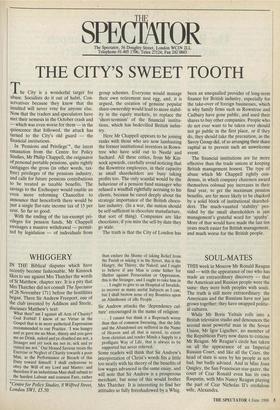The Spectator, 56 Doughty Street, London WC1N 2LL Telephone 01-405
1706; Telex 27124; Fax 242 0603
THE CITY'S SWEET TOOTH
The City is a wonderful target for abuse. Socialists do it out of habit, Con- servatives because they know that the insulted will never vote for anyone else. Now that the traders and .speculators have met their nemesis in the October crash and — which was even worse for them — in the quiescence that followed, the attack has turned to the City's old guard — the financial institutions.
In 'Pensions and Privilege'*, the latest emanation from the Centre for Policy Studies, Mr Philip Chappell, the originator of personal portable pensions, quite rightly castigages the gross (in other, words, tax- free) privileges of the pensions industry, and calls for future pensions contributions to be treated as taxable benefits. The savings to the Exchequer would enable an even more reforming Chancellor . to announce that henceforth there would be Just a single flat-rate income tax of 15 per cent. So far so good.
With the ending of the tax-exempt pri- vileges for pension funds, Mr Chappell envisages a massive withdrawal — permit- ted by legislation — of individuals from group schemes. Everyone would manage their own retirement nest egg, and, it is argued, the creation of genuine popular share-ownership would lead to more stabil- ity in the equity markets, to replace the 'short-termism' of the financial institu- tions, which has bedevilled British indus- try.
Here Mr Chappell appears to be joining ranks with those who are now lambasting the former institutional investors in Rown- tree who have sold out to Nestle and Suchard. All these critics, from Mr Kin- nock upwards, carefully avoid noticing that the Rowntree employees, in their capacity as small shareholders are busy taking profits too. The only scandal would be the behaviour of a pension fund manager who refused a windfall rightfully accruing to his clients, because he cared deeply about the strategic importance of the British choco- late industry. (In a war, the nation should be self-sufficient in chocolate manufacture, that sort of thing). Companies are like chocolates; if you miss the sell-by date they go stale.
The truth is that the City of London has been an unequalled provider of long-term finance for British industry, especially for the take-over of foreign businesses, which is why family firms such as Rowntree and Cadbury have gone public, and used their shares to buy other companies. People who do not ever want to be taken over should not go public in the first place, or if they do, they should take the precaution, as the Savoy Group did, of so arranging their share capital as to prevent such an unwelcome event.
The financial institutions are far more effective than the trade unions at keeping British management honest. The type of abuse which Mr Chappell rightly con- demns, in which company chairmen award themselves colossal pay increases in their final year, to get the maximum pension benefits, are far more likely to be checked by a solid block of institutional sharehol- ders. The much-vaunted 'stability' pro- vided by the small shareholders is just management's grateful word for 'apathy'. More of that would have made the last ten years much easier for British management, and much worse for the British people.


















































 Previous page
Previous page